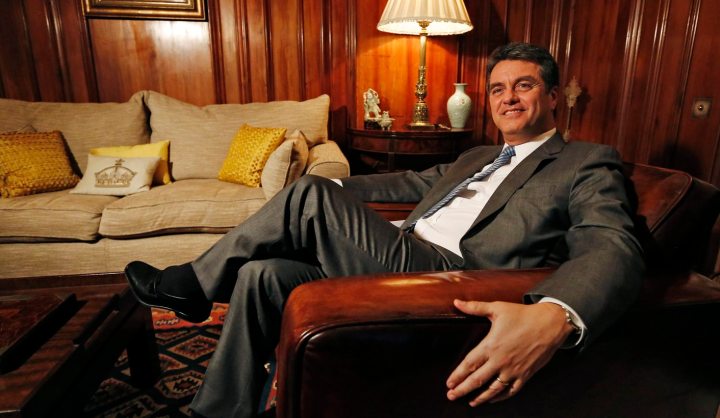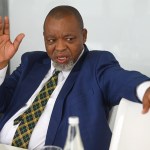Newsdeck
Brazil’s Azevedo Becomes First Latin American To Head WTO

Brazil's Roberto Azevedo has won the race to become the next head of the World Trade Organization, the first candidate from the BRICS club of emerging economies to take the job. By Tom Miles.
The career trade diplomat now faces a huge challenge to reinvigorate the global body, which has failed to wrap up the Doha trade liberalisation talks after years of stalemate and risks becoming irrelevant without a breakthrough.
Azevedo beat Mexico’s Herminio Blanco, widely seen as the favoured choice of the United States, in the final round of the contest to succeed France’s Pascal Lamy, who steps down on Aug. 31.
The result of the selection process was meant to be secret until a formal announcement on Wednesday, but the Brazilian government confirmed on Tuesday that Azevedo, 55, won by a wide margin.
Azevedo will become the first Latin American and the first representative of a BRICS nation to head the Geneva-based trade body since its creation in 1995, a sign of the rising clout of emerging economies as developed countries struggle to recover from the 2008 financial crisis.
“For Brazil it is clear that, given his commitment and experience, he would be able to lead the organisation toward a path of a fairer and more dynamic global economic order,” Brazilian President Dilma Rousseff said in a statement.
“This is not a victory for Brazil, nor for a group of countries, but for the World Trade Organisation.”
Brazil and Mexico, often seen as regional rivals, had pushed the case for their candidates, seeking to cement their status as growing powers.
Azevedo, who has been Brazil’s ambassador to the WTO, had touted his ability to listen to all sides in a negotiation and to find solutions by quietly building consensus, a contrast with Blanco’s idea of using the business sector to force governments to make deals happen.
“Selecting Roberto Azevedo means a lot to many in the WTO system who have been looking for a non-dogmatic perspective on trade liberalisation,” said Ricardo Melendez-Ortiz, a former Colombian trade negotiator who now heads the International Centre for Trade and Sustainable Development in Geneva.
“He’s probably more likely to be sympathetic to the views of African countries and developing countries that have been expecting delivery from the WTO on their issues … That doesn’t mean his job is going to be simple,” he added.
Brazil, the world’s seventh largest economy, has taken a more gradual approach to trade liberalisation that could be more appealing to developing nations. However, Brazil has been harshly criticised by other WTO members for raising duties on hundreds of imported goods and for favouring local producers in government purchases.
The global trade talks that began in Doha in 2001 reached deadlock in 2011, forcing the WTO to focus on a far smaller package of trade reforms and prompting many countries to pursue bilateral and regional trade deals instead, such as the U.S.-led Trans-Pacific Partnership.
Even the smaller package of reforms, widely seen as a crucial first step, is proving hard to agree on. At the same time, the WTO’s global rules risk getting drowned out by the plethora of regional deals now being negotiated.
HERCULEAN TASK
In Washington, the National Foreign Trade Council, a leading U.S. business group, praised Azevedo’s experience and the focus he had placed on consensus-building in Geneva, but warned that there was a big job ahead.
“The next head of the WTO faces two critical tasks in steering the membership toward a successful outcome to the ministerial conference this December in Indonesia and building consensus toward a broader agenda to modernize trade rules for the digital age,” said the group’s vice president, Jake Colvin.
The WTO’s biennial ministerial conference, which will be held in Bali, Indonesia, will be a baptism of fire for the new director general.
A deal the WTO is struggling to line up in Bali aims to cut bureaucracy by standardising customs procedures, lending a potential trillion-dollar boost to the world economy, while introducing new rules to promote food security and concessions for poorer countries.
But the United States and others have warned that on the current trajectory, the WTO is not going to get a deal in Bali, forcing a huge burden of expectation onto Azevedo.
He beat eight other candidates in a contest overseen by three WTO ambassadors, who totted up the support of the 159 member countries to settle on a single winner after three rounds of competition.
“The job requires the power of persuasion rather than coercion. In that respect, Azevedo knows both the opportunities and the limits of what a WTO leader can do,” said Jeffrey Schott, senior fellow at the Peterson Institute for International Economics in Washington.
“Hopefully he will think of some innovative ways to get the WTO to do some things better than it has for the last 15 years.” DM
Photo: Roberto Azevedo, then Brazil’s permanent representative to the World Trade Organization (WTO), speaks during an interview with Reuters in London March 14, 2013. REUTERS/Luke MacGregor




















 Become an Insider
Become an Insider